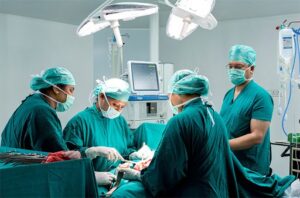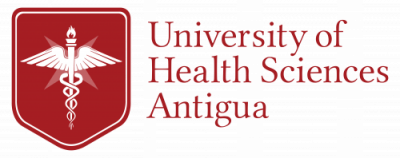
General Surgery: Satisfaction of Immediate Results
Surgeons save lives and heal the sick with their own hands. Surgery is the ultimate curative therapy for many patients and is an essential part of modern medicine. It is a career of constant excitement, high energy, quick decisions, and intellectual stimulation. No day is the same as the one before, and you learn to expect the unexpected.
It is extremely gratifying to see the immediate results of your actions: the changes you make in your patients’ anatomy and in the quality of their lives. Whether you are interested in performing open-heart surgery or repairing perforated peptic ulcers, you must first go through rigorous training in general surgery—the foundation and entry point for all areas of this branch of medicine. Some continue to practice as general surgeons; others move on to advanced training and become surgical subspecialists like cardiothoracic, pediatric,
or vascular surgeons.
Surgery, the treatment of disease by means of an operation, is often the definitive form of therapy—many times even curative—for a broad range of conditions affecting all organ systems. General surgery primarily encompasses diseases of the abdominal organs, breast, skin, and endocrine glands.
The surgical subspecialties focus on specific organs, like the heart and lungs (cardiothoracic) or certain patient populations (pediatric, trauma, transplant). No matter the subspecialty, surgeons are also knowledgeable in many aspects of critical care, such as manipulating ventilator settings and adjusting powerful blood pressure medications. Many patients undergoing complicated operations are still sick and unstable after leaving the operating room, requiring extensive management in the surgical
intensive care unit (SICU).
The Only True Generalist Left
An esteemed surgeon in academic practice commented that “the general surgeon is the only consummate physician left in the hospital.”
They treat diseases of the entire body that may or may not require surgical intervention. Some common examples include appendicitis, cholecystitis, pancreatitis, bowel obstruction, perianal abscesses, and a myriad of cancers. The diversity of general surgery extends past the strictly surgical into endocrine issues (thyroid, parathyroid, and adrenal disorders) as well as the complications of diabetes (leg ulcers, peripheral vascular disease).
Obesity, an epidemic sweeping across the US population, has also become the realm of the surgeon, with stomach stapling and gastric bypass procedures receiving a remarkable amount of media attention.
Although the basic principles of surgery have not changed in over a century, the field continues to develop, as highlighted by the introduction of innumerable elegant and ingenious laparoscopic procedures over the past decade. The most avant-garde frontier is robotic surgery, which is now gaining momentum in both the pediatric and adult populations. These new and evolving aspects give aspiring surgeons the opportunity use their ingenuity to expand medical horizons.
What is the Difference Between a Surgeon and Physician?
The distinction between physician and surgeon lies in this specialty’s emphasis on operating on patients—rather than treating disease with drugs.
After trying to manage a pathologic condition conservatively through medical management (meaning, pharmacologic, nonoperative interventions), physicians may have to refer patients for a surgical evaluation to receive definitive treatment.
Many patients operated on by surgeons have diseases with a primary underlying anatomic or structural abnormality that medications may not necessarily help. Examples include breast masses, hernias, abscesses, appendicitis, enlarging aortic aneurysms, blocked iliac arteries, and many more. For all surgical problems, however, surgeons draw on a fund of knowledge from many basic sciences; in particular, gross anatomy and physiology. Knowing the entire anatomy of the human body inside and out is absolutely essential, especially when many patients may have a normal anatomic variant. For instance, a routine gallbladder removal (cholecystectomy) can easily become quite complicated.
When surgeons begin operating, they may find an aberrant cystic duct in an abnormal configuration, or an artery that originates from a different place than expected.
What Qualities Make a Great General Surgeon?
Has excellent hand-eye coordination and manual dexterity.
Can think quickly and act decisively.
Enjoys mastering new technology.
Demands the highest level of perfection.
Is an energetic, dedicated, and compassionate physician.
What is Residency Training in General Surgery Like?
Residency in general surgery requires 5 years of postgraduate training. There are currently 254 accredited programs. Some programs offer (or require) an additional 1 to 3 years of research—basic science, clinical, or other creative options including biomechanics, robotics, and instrumental design. There is no argument that surgery is a tough residency.
Residents arrive at the hospital very early to round on their patients before heading to the operating room. Because patient care and consultations continue after finishing the scheduled operations, the days are long and physically demanding. The rigorous call schedules require residents to stay overnight every third or fourth night. In the first year, surgical interns spend little time in the operating room. They see patients in the hospital requiring surgical consult and master the essentials of postoperative care of patients on the surgical wards and intensive care unit.
Operating room time increases throughout the year. Residents spend the first 2 years primarily in general surgery but also rotating through surgical subspecialties like neurosurgery, urology, and orthopedics. The remaining 3 years are dedicated to improving operating skills through rotations in general, vascular, cardiothoracic, pediatric, and transplant surgery. Additional months of training include surgical intensive care and endoscopy.
Residency in general surgery provides the gateway to a number of surgical subspecialties that require fellowship training.
Why a Career in General Surgery May be Right for You
Surgery is the perfect field for those who want to see that their actions have an immediate and essential effect on their patient. It is an ideal career for those who want to heal, quite literally, with their hands.
Consider the treatment of a teenager with appendicitis: a discussion with the patient, a dose of antibiotics, anesthesia, incision, resection of the appendix, and discharge the following day. This relatively simple operation is the now routine act of saving a life. Before the era of antibiotics and rapid surgical treatment, appendiceal perforation was much more common, often leading to death from overwhelming abdominal infection.
A survey of 59 surgeons currently in practice said that it brought them joy to “fix patients.” They enjoy the patient interaction and diversity of cases; they love to use their hands and minds; and they enjoy operating. Many studies in the surgical literature suggest that to encourage students to choose surgery as their specialty, all that is necessary is to increase their exposure to it. If they see what surgeons do and how they love it, they will be bitten by the bug that has bitten so many—generation after generation.
Students who love a fast pace and high energy will thrive in this field. Nothing is greater than the unbelievable surge of adrenaline that occurs while scrubbing in, stepping into the operating room, and gowning up. Surgeons combine the scientific nature of a technician with the passion of an artist and the empathy of a physician. They demand nothing but the best for the patients, and they give nothing but the best in all of their efforts. Although challenging and demanding, surgery amply rewards all the effort you put into it.
Ready to Start Your Career as a Future General Surgeon?
If you are, then UHSA is for you. We are the second oldest medical school in the Caribbean Basin. That means we know what it takes to make great doctors. We have three programs for you to choose from.
Traditional MD Program – for those how have pre-requisites need for admission to medical school, this is the program for you.
Joint MD/MPH Program – for those who want to earn both their medical degree and a masters of public health (MPH), this is the program for you. An MPH is a highly coveted post-graduate qualification that will better equip you for careers in primary care, international health, or really any specialty.
Accelerated Premedical Program – for those who want to change careers, have always dreamt of being a physician, or are high school graduates, this program will give you the credits and background you need for direct admission to our MD program.
Contact our Admissions Team and begin your journey!

